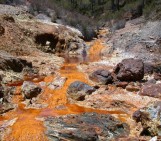
So George Osborne donned the ceremonial red briefcase on wednesday and took to the helm in the House of Commons (rather inconsiderately while I was in Brussels and couldn’t follow the news…) to deliver the Autumn Statement, one of the two statements that the HM Treasury makes each year to Parliament upon publication of economic forecasts (the other being the Budget which is normally announced in March-time).

George Osborne and Danny Alexander make their way to the House of Commons for the Autumn Statement Announcement. Source – Getty UK
Statements in the run up to wednesday suggested that Science and Engineering were likely to be singled out as the Chancellor’s ‘personal priority. In amongst all this were some announcements which relate directly to geology and in particular, Energy.
1 – North Sea Oil and Gas
The government announced plans to help maximise the economic benefits of the oil and gas resources in the UK Continental Shelf (UKCS). They estimate there is between 11-31 billion barrels still to be exploited and argue that it can provide considerable eonomic benefits to the UK through much sought energy security, high-value jobs and other things. These plans include setting out major reforms to the oil and gas fiscal regime which include a 2% reduction in the rate of the Supplementary Charge from 32-30%.
See 1.124 and 1.125 in the ‘Green Book‘ for more details.
2 – Investment fund for Shale Gas
The UK government has long championed shale gas development as a tool to increase the UK’s energy security, create new jobs and create tax revenue. As part of the government’s ongoing progress in shale gas development, the Autumn Statement detailed a new ‘£5 million fund to provide independent evidence directly to the public about the robustness of the existing regulatory regime’. The reasoning for this is that it will ensure the public is better engaged in the regulatory process.
See section 1.121 in the ‘Green Book‘ for more details.
3 – Funding for sub-surface testing facilities
An interesting inclusion is a £31 million fund for investment into creating so-called ‘sub-surface research test centres’ through the Natural Environment Research Council (NERC). These will be designed to develop world leading knowledge of energy technologies such as shale gas and carbon capture and storage.
See section 1.122 in the ‘Green Book‘ for more details.
4 – Move towards developing the Swansea Bay Tidal Lagoon
As part of the governments commitments to decarbonisation targets they have announced plans for ‘closer discussions’ with the company managing the project at Swansea Bay, Tidal Lagoon Power Ltd to establish whether a tidal lagoon project is affordable and value-for-money for consumers. If this project were to progress it could become the first tidal lagoon project in the world.
For more information on the proposed tidal lagoon project see this story on the BBC News Website and see 1.129 in the ‘Green Book‘.
5 – Postgraduate Funding
And lastly there was a pretty important note about Postgraduate Taught Masters funding. The geological community has been dismayed at the lack of funding for postgraduate taught masters for sometime in particular becuase many of the Taught Masters Programs (such as Petroleums Geophysics and Hydrogeology) are seen as essential for careers in these areas. The lack of any funding framework for such courses, and the reduction in Industrial funding and scholarships has put real pressure on students wanting to pursue careers in this highly technical area. The government announced in the Autumn Statement that it will introduce a postgraduate loans system offering £10,000 to students under 30 (bit mean!) from 2016-2017. A consultation to inform the design of the scheme is set to follow early next year.
For more information on this announcement see this piece in the Times Higher Education webpage.



